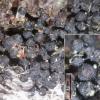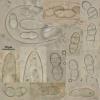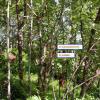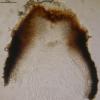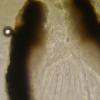
01-03-2026 15:31
 Csaba Németh
Csaba Németh
Hello!I found these apothecia on Homalothecium lue

01-03-2026 14:10
 Antonio Couceiro
Antonio Couceiro
Hola, me gustaria conocer opiniones sobre este tem

19-02-2026 17:49
Salvador Emilio JoseHola buenas tardes!! Necesito ayuda para la ident

01-03-2026 08:55
 Michel Hairaud
Michel Hairaud
Bonjour , Je souhaiterais recevoir cet article :�

28-02-2026 14:43
A new refrence desired :Svanidze, T.V. (1984) Novy

27-02-2026 17:51
 Michel Hairaud
Michel Hairaud
Bonjour, Quelqu'un peut il me donner un conseil p
Melanomma?
Hans-Otto Baral,
20-08-2010 13:11
 Hi
HiIn Middle-Sweden (Saxnäs) grew a bitunicate pyreno on Sorbus aucuparia standing branch together with Orbilia aristata etc. I compare ist with Melanomma but the spores are hyaline, apparently they are ejected when 1-septate, but get more septa when older, still remaining hyaline. Many perithecia are overmature but some are o.k.
Zotto
Hans-Otto Baral,
20-08-2010 13:14
Hans-Otto Baral,
07-09-2010 22:54

Re:Melanomma?
I've sent my images to Walter Jaklitsch, and he has an idea:
"I collected this fungus several times on about 10 different, unrelated hosts including Spiraea. Some of my specimens were examined by Andre Aptroot, who determined them as Dothidotthia ramulicola (Peck) M.E. Barr. I think one of them was also confirmed by Barr as this fungus. I do not think that they were right, because Dothidotthia has broad, nearly ellipsoid asci with biseriate ascospores, while Otthia has cylindrical asci with uniseriate ascospores, similar to your specimen, where perhaps the spores are not strictly uniseriate.
Anyway, I think that your fungus is Otthia spiraeae (there may be several species hidden under this name ??), immature and aberrantly developed. It seems that ascospores develop very slowly in this species and that unfavourable conditions disturb their development, leaving them in a certain stage without chance of maturing. When mature, ascospores of Otthia spiraeae are about (17-)21-28 x 11-13(-15) µm, very dark brown, 2-celled, with or without various combinations of delicate secondary septa; the 2 cells may be grossly muriform; when hyaline they are 16-23(-25) x 7-9 µm and also develop quite strange combinations of septa, as you show in one of the images. I collected specimens with hyaline ascospores from December to April, so this kind of development may be correlated with low temperatures, or let´s say development is retarded or stopped by low temperatures (?).
Also the ascomata in your images are exactly what I have seen, often with a pallid or dark and stellate ostiolar area in the same specimen.
Interestingly, Barr descibed additional/secondary septa for D. ramulicola
and also ascospore size (of the hyaline spores) fits better. So, in absence
of an anamorph, and if the asci may not be so important, one could also
think of D. ramulicola."
"I collected this fungus several times on about 10 different, unrelated hosts including Spiraea. Some of my specimens were examined by Andre Aptroot, who determined them as Dothidotthia ramulicola (Peck) M.E. Barr. I think one of them was also confirmed by Barr as this fungus. I do not think that they were right, because Dothidotthia has broad, nearly ellipsoid asci with biseriate ascospores, while Otthia has cylindrical asci with uniseriate ascospores, similar to your specimen, where perhaps the spores are not strictly uniseriate.
Anyway, I think that your fungus is Otthia spiraeae (there may be several species hidden under this name ??), immature and aberrantly developed. It seems that ascospores develop very slowly in this species and that unfavourable conditions disturb their development, leaving them in a certain stage without chance of maturing. When mature, ascospores of Otthia spiraeae are about (17-)21-28 x 11-13(-15) µm, very dark brown, 2-celled, with or without various combinations of delicate secondary septa; the 2 cells may be grossly muriform; when hyaline they are 16-23(-25) x 7-9 µm and also develop quite strange combinations of septa, as you show in one of the images. I collected specimens with hyaline ascospores from December to April, so this kind of development may be correlated with low temperatures, or let´s say development is retarded or stopped by low temperatures (?).
Also the ascomata in your images are exactly what I have seen, often with a pallid or dark and stellate ostiolar area in the same specimen.
Interestingly, Barr descibed additional/secondary septa for D. ramulicola
and also ascospore size (of the hyaline spores) fits better. So, in absence
of an anamorph, and if the asci may not be so important, one could also
think of D. ramulicola."
